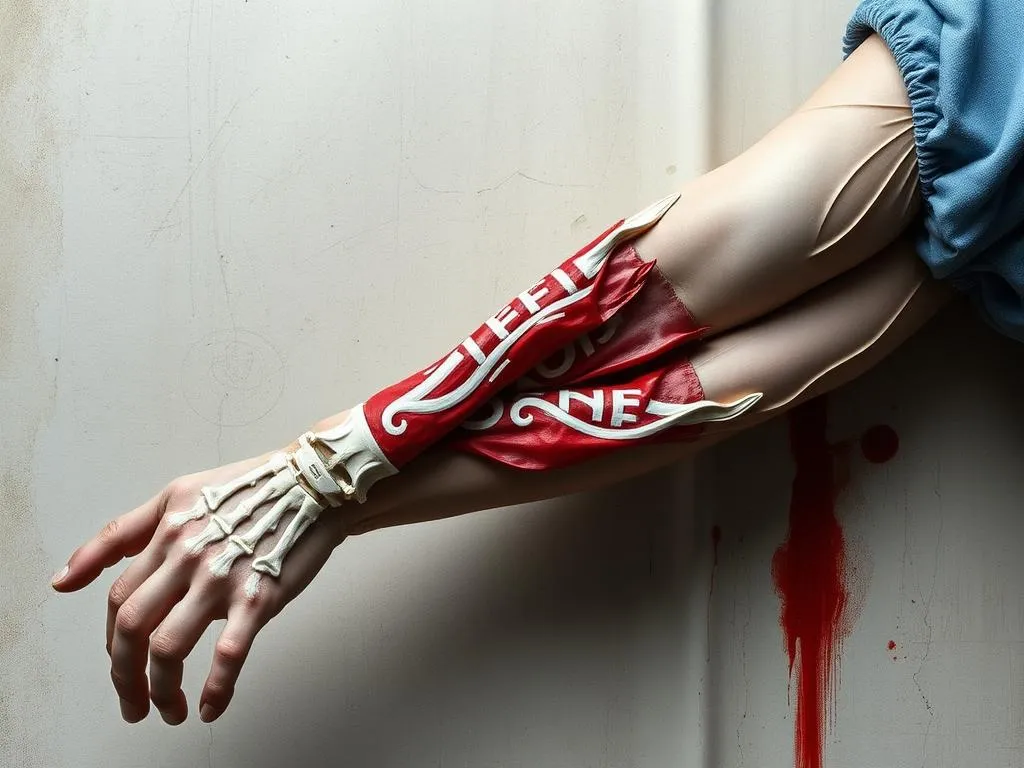The severed arm holds profound spiritual significance, representing a transformative journey of loss, healing, and personal growth. In this article, we’ll explore the deeper meaning behind this powerful symbol and how it can guide us towards a more enlightened understanding of ourselves and the world around us.
In the realm of spiritual symbolism, the severed arm can represent a profound loss or separation, a severing of ties with the past, or a significant turning point in one’s life. It may signify the need to let go of old patterns, beliefs, or attachments in order to embrace a new path forward. The severed arm spiritual meaning invites us to reflect on the lessons we can learn from these challenging experiences and how they can shape our personal growth and spiritual awakening.
Key Takeaways
- The severed arm symbolizes a significant life transition or loss, which can be a catalyst for personal transformation.
- This symbol encourages us to let go of the past and embrace new opportunities for growth and self-discovery.
- Exploring the severed arm spiritual meaning can help us develop a deeper understanding of our own strengths, resilience, and inner power.
- Engaging with this symbolic representation can provide insights into the healing process and the importance of embracing change.
Exploring the Severed Arm Spiritual Meaning
The severed arm is a powerful symbol that has been present in various cultural and religious traditions throughout history. In some ancient mythologies, the severed arm represents the loss of power, authority, or control, signifying a need to surrender and let go of the ego.
In certain indigenous cultures, the severed arm may be seen as a symbol of sacrifice, where the individual willingly gives up a part of themselves for the greater good of the community. This act of selflessness and devotion can be a transformative experience, leading to a deeper understanding of one’s place in the world and the interconnectedness of all things.
Moreover, the severed arm can be interpreted as a metaphor for the separation between the physical and spiritual realms. The arm, as a physical extension of the body, can be seen as a symbol of our connection to the material world. When this connection is severed, it can prompt a deeper exploration of our spiritual nature and the hidden dimensions of our existence.
The Healing Journey
The severed arm spiritual meaning also encompasses the process of healing and regeneration. Just as the physical body has the remarkable ability to heal and regrow lost limbs in certain species, the spiritual journey can involve a similar process of renewal and transformation.
When we experience a significant loss or trauma, it can feel as if a part of ourselves has been severed or torn away. However, the severed arm symbol reminds us that even in the midst of darkness, there is the potential for growth and rebirth. What can we learn from this profound symbol about the resilience of the human spirit and the power of transformation?
As we navigate the healing process, the severed arm spiritual meaning encourages us to embrace the unknown, to trust in our own inner resources, and to find the strength to move forward, even when the path ahead is uncertain. It reminds us that the loss of one thing can pave the way for the emergence of something new and profound.
Embracing Change and Letting Go
One of the key messages of the severed arm spiritual meaning is the importance of letting go and embracing change. When we cling to the past or resist the natural flow of life, we can become stagnant and disconnected from our true selves. The severed arm symbolizes the need to release our attachment to the known and the comfortable, and to open ourselves up to the transformative potential of the unknown.
This process of letting go can be challenging, as it often requires us to confront our fears, our insecurities, and the deeply-rooted beliefs that have shaped our lives. However, by embracing the severed arm spiritual meaning, we can learn to navigate these transitions with greater grace and resilience.
What if the severed arm is not just a symbol of loss, but a gateway to a deeper understanding of ourselves and our place in the world? By exploring this powerful symbol, we can uncover the hidden wisdom that lies within our own experiences of change and transformation.
Reclaiming Your Power
The severed arm spiritual meaning also speaks to the idea of reclaiming our personal power and agency. When we experience a significant loss or trauma, it can feel as if we have lost control over our lives. However, the severed arm symbol reminds us that even in the midst of adversity, we have the power to shape our own destiny.
By embracing the severed arm spiritual meaning, we can learn to let go of the things we cannot control and focus on the aspects of our lives where we can make a difference. This may involve cultivating greater self-awareness, developing new skills and abilities, or finding ways to contribute to the world in a meaningful way.
As we navigate this journey of reclaiming our power, the severed arm spiritual meaning can serve as a guiding light, reminding us of the resilience and strength that lies within each of us. What insights can we gain from this symbol about the nature of our own personal power and the ways in which we can use it to create positive change in our lives?
Conclusion
The severed arm spiritual meaning is a profound and multifaceted symbol that invites us to explore the deeper dimensions of our existence. Whether we are facing a significant loss, navigating a transformative life transition, or seeking to reclaim our personal power, this symbol can serve as a powerful tool for self-reflection and spiritual growth.
By embracing the lessons of the severed arm, we can learn to let go of the past, embrace the unknown, and tap into the vast reservoirs of strength and resilience that lie within us. In doing so, we may discover that the severed arm is not a symbol of weakness or loss, but a testament to the incredible capacity of the human spirit to overcome adversity and emerge stronger than ever before.








